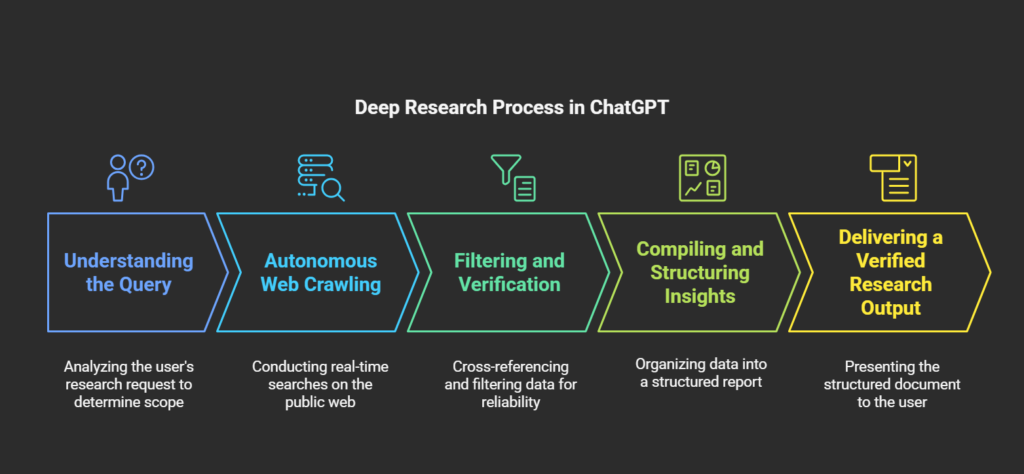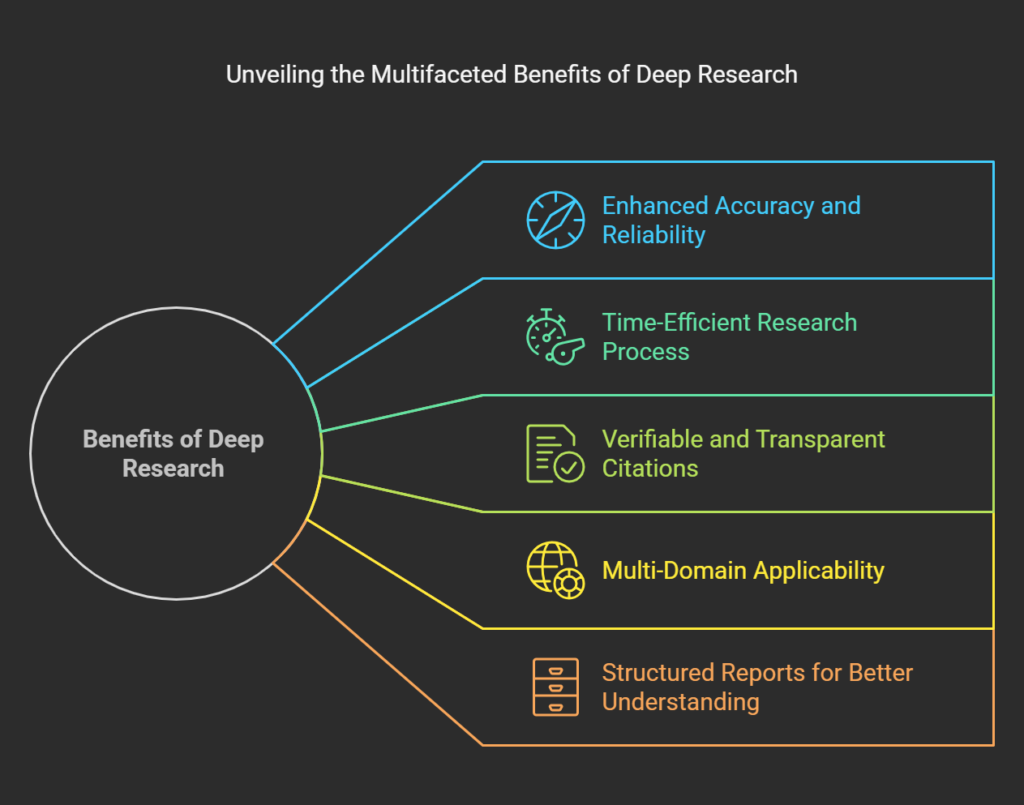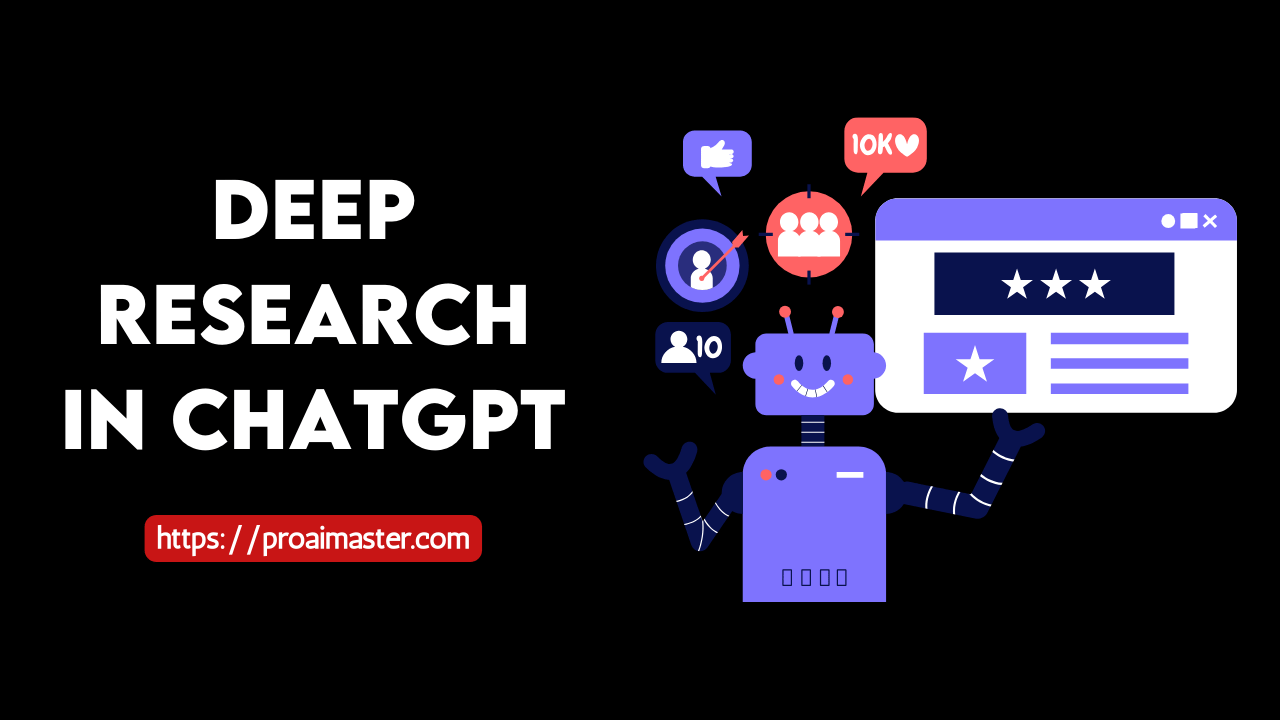In the rapidly evolving landscape of artificial intelligence, OpenAI has introduced a groundbreaking feature called Deep Research in ChatGPT. This advanced capability is designed to revolutionize online research by enabling users to conduct in-depth, multi-step investigations with verified sources and clear citations.
This article explores how Deep Research in ChatGPT is transforming the way professionals in finance, law, science, and other knowledge-intensive fields gather and analyze information. We’ll cover its key features, use cases, benefits, limitations, and practical applications to help you make the most of this AI-powered tool.
What Is Deep Research in ChatGPT?
Deep Research is a specialized AI functionality that enhances ChatGPT’s ability to search, analyze, and compile insights from the public web. Unlike traditional AI responses, which rely on pre-existing knowledge and training data, Deep Research autonomously gathers updated information, ensuring accuracy and reliability.
Key Features of Deep Research:
- Autonomous Web Searching – Conducts real-time searches across multiple sources.
- Multi-Step Research Capabilities – Gathers, verifies, and compiles information efficiently.
- Cited Sources – Provides references, making it easier to validate findings.
- Enhanced Reasoning Model – Uses OpenAI’s advanced o3 reasoning model for better analysis.
- User-Defined Research Scope – Accepts queries with attachments, images, or spreadsheets for deeper context.
- Structured Reports – Outputs well-organized, easy-to-read research documents.

How Deep Research Works? A Step-By-Step Guide
Deep Research in ChatGPT follows a structured process to ensure the information retrieved is accurate, well-researched, and contextually relevant.
Step 1: Understanding the Query
When a user inputs a research request, Deep Research first analyzes the query, determining the scope and necessary parameters. If additional clarification is required, it may generate a form to refine the research focus.
Step 2: Autonomous Web Crawling
Once the query is defined, Deep Research conducts real-time searches on the public web, exploring multiple authoritative sources to collect relevant data.
Step 3: Filtering and Verification
The AI cross-references findings, filters out unreliable sources, and ensures the collected information is consistent and credible.
Step 4: Compiling and Structuring Insights
Deep Research organizes the collected data into a well-structured report, complete with citations, summaries, and key takeaways for easy readability.
Step 5: Delivering a Verified Research Output
Finally, the structured document is presented to the user, with clear citations, enabling further verification and reference.
Benefits of Deep Research in ChatGPT
Deep Research is a game-changer for professionals who require precise, well-documented information. Here are some key benefits:

1. Enhanced Accuracy and Reliability
Unlike traditional AI responses that rely on static training data, Deep Research fetches real-time information, reducing the risk of outdated or inaccurate insights.
2. Time-Efficient Research Process
Instead of manually sifting through multiple sources, users can get a comprehensive report within minutes, saving hours of research time.
3. Verifiable and Transparent Citations
With clearly cited sources, users can cross-check the information, ensuring credibility and trustworthiness.
4. Multi-Domain Applicability
Deep Research is beneficial across various industries, including finance, healthcare, law, academic research, and technology.
5. Structured Reports for Better Understanding
The output is neatly organized, eliminating the need for users to restructure or refine the information manually.
Use Cases of Deep Research in ChatGPT
1. Academic Research
Students, researchers, and educators can use Deep Research to gather verified data, compile literature reviews, and access credible sources for thesis writing and academic papers.
2. Market and Competitive Analysis
Businesses can leverage Deep Research to conduct competitor analysis, track industry trends, and gather insights for strategic decision-making.
3. Legal and Compliance Research
Lawyers and compliance officers can use Deep Research to find legal precedents, analyze regulations, and gather case studies from reliable sources.
4. Healthcare and Medical Insights
Medical professionals can access verified research on treatments, drug interactions, and recent developments in the healthcare sector.
5. Tech and AI Advancements
Engineers, developers, and tech enthusiasts can stay updated with the latest AI breakthroughs, software updates, and programming methodologies.
6. Smart Shopping and Consumer Research
Buyers looking for high-value purchases can use Deep Research to compare products, read verified reviews, and make well-informed decisions.
Limitations and Restrictions of Deep Research
While Deep Research is a powerful tool, it does have certain limitations.
1. Limited Access for Pro Users
Currently, only Pro users outside the UK, Switzerland, and the European Economic Area (EEA) have access to Deep Research. Expansion plans include Plus, Team, and Enterprise users.
2. Dependence on Public Web Data
Deep Research can only access publicly available data. It does not have access to private databases, paywalled content, or proprietary research papers.
3. Potential Bias in Source Selection
The AI relies on publicly available sources, which may sometimes introduce bias depending on the dataset it retrieves information from.
4. Availability on Web-Only (For Now)
Initially, Deep Research is only available on ChatGPT’s web version. However, OpenAI has plans to expand it to mobile and desktop applications.
How to Use Deep Research in ChatGPT
Step-by-Step Guide
- Select ‘Deep Research’ when typing your query in ChatGPT.
- Describe your research needs in detail, specifying key focus areas.
- Attach files or images if necessary to provide additional context.
- Submit the query and wait for ChatGPT to process the request.
- Review the structured report with citations and insights.
By following these steps, users can maximize the potential of Deep Research for their specific needs.
Future of Deep Research in ChatGPT
OpenAI is continuously improving its AI capabilities, and Deep Research is expected to evolve with:
- Expanded Regional Access – Making it available to more users globally.
- Integration with Mobile & Desktop Apps – Enabling cross-platform research capabilities.
- Enhanced Data Filtering – Improving source validation to minimize bias.
- More Customization Options – Allowing users to refine their research scope with advanced filters.
As AI continues to advance, Deep Research will play a vital role in shaping how individuals and businesses access and utilize information.
Conclusion
Deep Research in ChatGPT is a revolutionary tool that bridges the gap between AI-powered assistance and high-quality, verified research. With its ability to autonomously search, analyze, and compile structured reports with citations, it is transforming knowledge work across various domains.
Whether you’re a researcher, business professional, or consumer looking for in-depth insights, Deep Research provides smarter, verified, and efficient solutions. As OpenAI continues to enhance this feature, its impact on AI-driven knowledge retrieval will only grow stronger.
FAQs
What is Deep Research in ChatGPT?
Deep Research is an advanced AI feature that enables ChatGPT to conduct in-depth, multi-step research using real-time web searches, verified sources, and structured citations.
Who can use Deep Research?
Currently, Deep Research is available to Pro users outside the UK, Switzerland, and the European Economic Area (EEA). OpenAI plans to expand access to Plus, Team, and Enterprise users in the future.
How does Deep Research ensure accuracy?
Deep Research autonomously searches multiple authoritative sources, cross-verifies information, and provides citations for transparency and credibility.
Can Deep Research access private databases or paywalled content?
No, Deep Research can only retrieve publicly available information from the web and cannot access private, paywalled, or proprietary databases.
How is Deep Research different from regular ChatGPT responses?
Unlike standard ChatGPT responses, which rely on pre-existing training data, Deep Research actively searches the web for the most up-to-date information and compiles structured reports with citations.
How can I use Deep Research in ChatGPT?
Simply select ‘Deep Research’ when entering a query, provide details on what you need, and wait for ChatGPT to generate a structured, citation-backed research report.
What are the limitations of Deep Research?
Deep Research is currently limited to Pro users in specific regions, depends on public web data, and may be influenced by biases in online sources.
Is Deep Research available on mobile apps?
As of now, Deep Research is only available in ChatGPT’s web version, but OpenAI plans to introduce it to mobile and desktop apps soon.
How often is the research data updated?
Deep Research fetches real-time data from publicly available sources, ensuring users receive the most current and relevant insights.
Can I customize my Deep Research queries?
Yes, users can provide detailed requirements and even attach files or images to refine the research scope and obtain more relevant results.

Muhammad Ahmad is a dedicated writer with 5+ years of experience delivering engaging and impactful content. He specializes in simplifying complex topics into easy-to-read articles.


